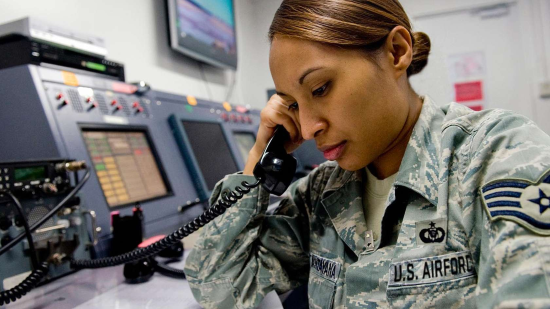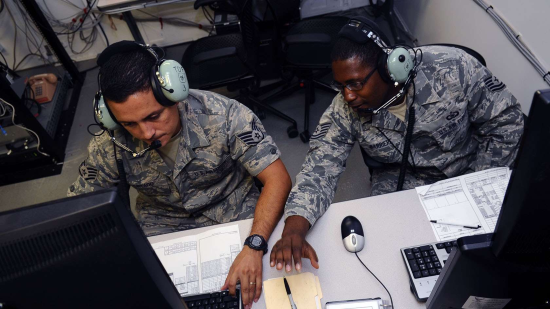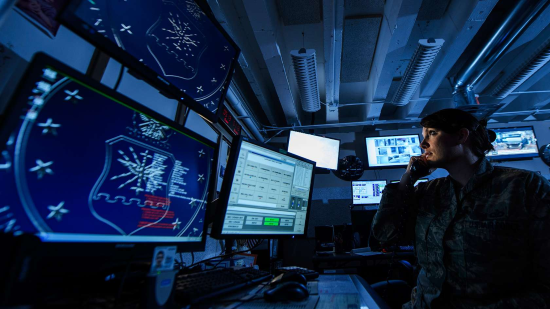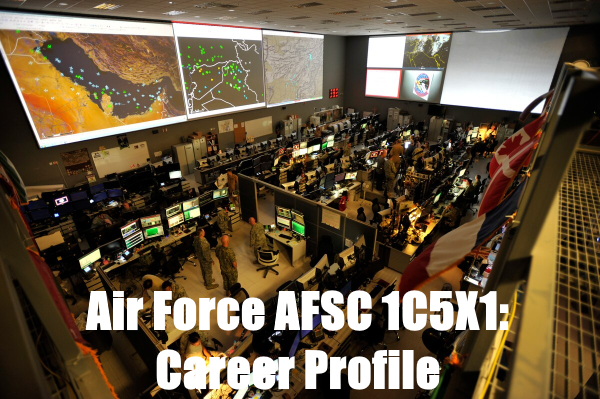Command and Control Battle Management Operations is an integral part of the U.S. Air Force and overall national security.
Specialists in this career field provide radar control and monitor global airspace through the expert operation of systems across the globe.
Their roles enhance mission success for the Air Force as well as the safety of the nation and its citizens.
Here is a career profile of Air Force Command and Control Battle Management Ops (1C5X1).
Related Article – Air Force Administration: 3F5X1 & 3F531 Career Profiles
Table of Contents
Overview Of Command And Control Battle Management Ops

Air Force specialists in this career field manage and operate Command and Control Battle Management Operation systems.
This means providing radar control and monitoring air weapons during offensive and defensive air operations.
Their decisions are often made within the conduct of battle management air operations as well as system equipment management at tactical and operational levels of war.
Service members with AFSC (Air Force Specialty Code) 1C5X1 conduct mission planning, interpret and react to radar data and console display information, and test and evaluate new equipment capabilities.
These airmen perform surveillance, combat identification, weapons control, and tactical data link management.
In addition, they gather, record, and distribute operational information along with air defense and air traffic control agencies.
Overall, their expertise in communications and computer system management allows for countering electronic attack with electronic protection.
Duties Of AFSC 1C5X1
AFSC 1C5X1 encompasses a multitude of duties.
Primarily, airmen within this specialty identify, maintain surveillance, and assist in controlling aerospace objects.
They operate aerospace control, warning systems, and simulation equipment.
This includes assisting in weapons control and performing data link and data management functions in aerospace systems.
Additional specific duties include:
- Interpreting and reacting to radarscope presentation and generated console displays
- Comparing and reporting track positions based on flight data or database files
- Tearing down, loading, unloading, erecting equipment and components
- Participating as crew member of operational unit in functions of air weapons control
- Ensuring safety of flight for controlled air operations
- Testing and evaluating capabilities of new equipment and propriety of new procedures
Information Communication
Handling and communicating information is a vital aspect of the duties of Command and Control Battle Management Ops.
Airmen in this specialty gather, display, record, and distribute operational information.
They also coordinate and exchange air movement and identification information in relation to aircraft operations among air defense, air control, range control, and air traffic control agencies.
This includes operating data link equipment and automated data exchange devices for gathering and relaying operation information.
Other specific information communication duties include:
- Reporting emergency signals
- Reporting ECM (electronic countermeasures) observations
- Evaluating radar detection and performance
- Maintaining logs, forms, and database files
- Ensuring safe passage of friendly air traffic by maintaining communication with air defense artillery and surface and naval fire units
Related Article – Air Force Airfield Management Specialist (1C7X1): Career Details
ECCM (Electronic Counter-Countermeasures) Functions

Performing ECCM duties and functions is another important aspect of AFSC 1C5X1 responsibilities.
Airmen in this specialty use ECCM techniques with to eliminate degradation caused by electronic warfare activities or other influences.
They accomplish this by maintaining maximum radar sensitivity.
In addition, they monitor operation of the following:
- Radar inputs
- Countermeasure consoles
- Anti-jamming displays
- Radar sensors
This monitoring enhances radar presentations.
Overall, AFSC 1C5X1 airmen understand and recommend procedures and techniques to improve the effectiveness of ECM and ECCM activities.
Qualifications For AFSC 1C5X1
Candidates for AFSC 1C5X1 must have a minimum education level of high school diploma or GED equivalent.
Successful completion of high school courses in algebra and geometry is beneficial.
In addition, they must earn a general ASVAB (Armed Services Vocational Aptitude Battery test) score of 55.
Other qualifications for this Air Force specialty include:
- United States citizenship
- Minimum age of 17 and maximum age of 39
- Valid state driver’s license to operate government motor vehicles
- Completion of current National Agency Check and/or Local Agency Checks and Credit (this specialty requires regular access to secret material and/or environment)
- Completion of basic military training
- Compliance with Ground Based Controller Duty medical standards
- Normal color vision
- Clear and distinct oral communication skills in English (measured by Reading Aloud Test)
- Eligible to mobilize and deploy globally
- Knowledge of aerospace surveillance and reporting systems
Additional Specialty Qualifications
Within the Air Force Specialty 1C5X1, service members are required to be knowledgeable and show expertise in many areas.
This includes the capabilities and limitations of aerospace surveillance and reporting systems as well as radar, radio, and other communication equipment.
Airmen in this career field must also have knowledge of aircraft and missile detection and tracking systems and procedures.
In terms of aircraft, expertise is needed in:
- Control procedures and techniques
- Performance characteristics
- Armament
Expertise in system information and characteristics is also required in terms of:
- Radar console and data link equipment presentations
- Receiving, recording, relaying system information
- Characteristics of fixed and mobile command and control systems
In addition, it is important to understand meteorology in this career field as it relates to air weapons control operations and affects radar operations.
Related Article – Air Force Knowledge Operations Management (3D0X1): Career Details
Training For Command And Control Battle Management Ops

Training for Command and Control Battle Management Ops begins with 7.5 weeks of basic military training.
In addition to completion of basic training, candidates must undergo technical training for 30 days at Keesler Air Force Base in Mississippi, the tech school location.
Upon completion of technical training, enlisted airmen will have credits earned toward Air and Space Operations Technology.
The following is required training and experience for each AFSC listed:
1C531
AFSC 1C531 requires completion of basic Command and Control Battle Management Operations Apprentice course.
This course includes a foundation of aerospace control and warning systems.
1C531D
AFSC 1C531D requires completion of the apprentice course and Weapons Director Ground-Based Training course.
This is the equivalent of undergraduate air weapons controller training.
1C551
Airmen must qualify and hold AFSC 1C531 with experience performing operational functions within the Command and Control Battle Management Operations systems.
1C551D
Airmen must be qualified in and hold AFSC 1C551 or 1C531D along with experience controlling and directing in the following:
- Air Combat Training
- Dissimilar Air Combat Training
- Offensive and Defensive Counter Air missions
- Strike/Interdiction missions
- Aerial refueling
1C571
Airmen must be qualified in and hold AFSC 1C551 and have experience performing or supervising functions such as:
- Aerospace surveillance
- AOC operations
- Combat identification
- Data link operations
- EA and EP activities
1C571D
Airmen must be qualified in and hold AFSC 1C551D in addition to performing or supervising, controlling or directing, ACT/DACT missions.
Other mission experience includes OCA/DCA, Strike/Interdiction, aerial refueling, and force marshalling or Large Force Employment.
The below Youtube video produced by the Air Force does a great job outlining the career in detail:
Conclusion
Members of the Air Force Command and Control Battle Management Ops carry great responsibility and have multiple duties within their branch.
This career field offers numerous opportunities to develop expertise in several areas, including operating sophisticated radar and electronic systems.
Those who are trained in this specialty are essential in air operations, both offensive and defensive.
Therefore, these airmen are an important part of the safety and security of global airspace.
There are several potential duty station assignments, and deployment sites, across the world for airmen in this career field.
Some of these locations include:
- Italy
- Japan
- Alaska
- Hawaii
- Germany
- South Korea
- Florida
- Arizona
- Louisiana
- South Carolina
Airmen in Command and Control Battle Management Ops are integral to successful military and Air Force missions in addition to keeping the nation safe.
- Ikon Pass Military Discount: Learn How To Save Big - January 31, 2025
- RTIC Military Discount: Find Out How To Save Big on Gear - January 30, 2025
- Traeger Military Discount: Learn How To Save Big on Smokers - January 28, 2025





